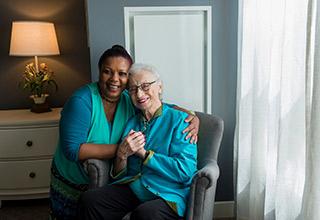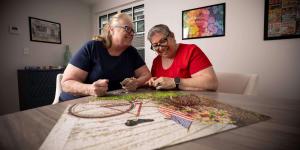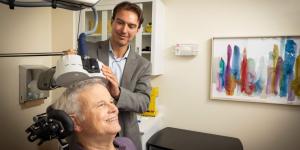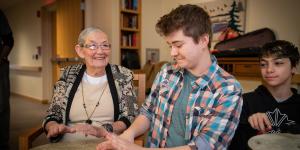How to Help Disorientation Caused by Dementia
Confusion with time and place can be common for people with dementia. Get tips from the experts at the Wolk Center for Memory Health.
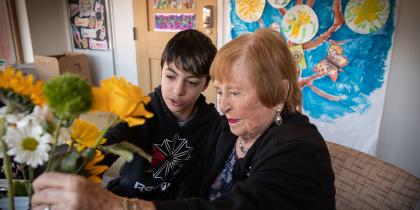
It’s easy enough for any of us to lose track of time, forget the date, not know what day of the week it is, or even be unsure of where we are. As we get lost in the business of our lives, it’s normal to occasionally find ourselves a little disoriented.
However, when our brains are functioning normally, we always keep a steady general sense of time and space. Perhaps you wake up not knowing the specific date, but you still know it’s the fall, it is the beginning of October, you’re at the beginning of the work week, and if you’re unsure as to where you are, you can figure it out, or recall it quickly enough by looking around. Brain diseases that cause cognitive decline, like Alzheimer’s disease, affect that anchoring sense of general orientation. For that reason, health professionals typically ask what date it is and where we are as part of a cognitive evaluation.
Dementia and confusion with time and place
Individuals with dementia often have problems with orientation to time and place. They forget the date, do not recall the month or the year, can’t recall the name of the town, or even the kind of building they are in. Their problems surpass a lack of attention and reflect the loss of general or “ballpark” orientation.
When this happens, individuals are left floating in a scary limbo of questions like “where am I?” or “why am I here,” and this leads to great confusion and disability. Our capacity to think and act is fundamentally affected when we have no idea when, where, and particularly who we are. The latter, known as orientation for self, is hardest to lose and is a sign of particularly serious brain pathology.
To remain orientated means that an individual with dementia is less severely afflicted and also less disabled. The remarkable thing is that if you help an adult with dementia regain a sense of orientation, that alone has trackable benefits on overall cognition. This realization invites the notion of “reality orientation” as treatment: If people with dementia are given “tags” of orientation (e.g. the day, the month, the weather, etc.), they may be able to build from these tags, anchor themselves in reality, and actually function better.
Reality orientation in patients with dementia
Reality orientation aims to improve the quality of life of older adults with cognitive problems or dementia by elevating their sense of time, place, and self. Reality orientation programs can include many different activities, such as the use of calendars and clocks, games with maps, poster and illustrations of places, color-coded rooms and spaces, drawing, consistent mentioning of date and location when talking, associating time or place information with other contextual cues, and more.
Since the 1960s, many studies have investigated the potential benefits of reality orientation programs on cognitive functioning, memory, and decision making in individuals with cognitive impairment or dementia. A meta-analysis of some of these studies revealed that 72% of the patients treated with reality orientation showed improvement, and that programs that include more reality orientation approaches yielded better results. The research also showed that making reality orientation a habit is critical to achieving lasting benefits.
Over half of the degree of disability and the impact of dementia on daily activities and well-being can respond to behavioral interventions, psychological treatments, social work support, and family care. With the proper supports, like those we offer at the Deanna and Sidney Wolk Center for Memory Health at Hebrew SeniorLife in Boston, MA, there is a lot that you can do to affect your loved one’s quality of life.
How to use reality orientation when caring for a loved one with dementia
It can be monotonous and frustrating to constantly remind a loved one with dementia about the date or the place. However, the effort is worth it. Here are some tips:
- Approach reality orientation techniques in an empathetic manner. Do not correct harshly, but rather make suggestions.
- Show sensitivity when addressing your loved one. You don’t want to further confuse them or intimidate them if they are very much in “their own reality.”
- Choose your words and expressions carefully. It could be difficult for people with dementia to understand what “in half an hour” or “by noontime” means. If you change the way you address time, it could help your loved one feel better oriented, less confused, and safer. Instead, use a physical clock to point at the time. You may need to do that several times. Make sure you remind repeatedly and persistently.
- Link reminders to emotional content because it is easier to remain oriented when time and place information is associated with emotionally relevant cues. For example, it’s easier to remember that this month is the one after your birthday, or that we’re in the town where our son lives, than to recall October or Philadelphia.
- Create a stable and consistent environment. Make sure items in the home remain where they have always been (if possible and if safe). If changes need to be made, make sure to be consistent. Be as clear as possible, and create routines.
At the Wolk Center for Memory Health, we can offer counsel and support about the best approach for reality orientation for a given patient and family. Sometimes we offer suggestions about simple adjustments to the physical environment.
For example, people living with dementia often get confused about the season they’re in. Due to this confusion, they leave home wearing a big winter coat during a hot summer day or go out with open-toed shoes during a winter storm. A way to address this could be by swapping out specific items of clothing from your loved one’s closet depending on the season. That way when getting dressed, they only have the appropriate options available to them.
Dementia can also cause a disruption of the body’s “internal clock.” To help your loved one become oriented to the time of day, try these tips:
- In the morning, make sure that natural light gets in and have bright lights on; in the late afternoon/evening, make sure shades or curtains are closed and begin dimming lights. During the daytime, it could be helpful to use light tables.
- A structured and consistent sleep schedule could also help your loved one better understand the time of day.
- Try placing smart speakers around the house, like Amazon’s Alexa, that are programmed to repeat the date, time, medication reminders, pre-recorded messages from caregivers, and more.
- Along with a large calendar, you could also use a white board where you write and update the daily schedule. Have images of all the seasons and weathers to pin to the white board. That way you can select the correct images for the day as a visual cue for their loved one.
If you need help caring for a loved one with dementia, or are unsure about a diagnosis or treatment plan, Hebrew SeniorLife’s Wolk Center for Memory Health is here for you. A team including neurology, social work, care management, and more can create an individualized plan that’s right for your family. Are you interested in learning more? Give us a call at 617-363-8600 or contact us today.
Rayha Kelly McPherson, Nathaly Lopera, and Alvaro Pascual-Leone, MD, PhD contributed to this post
Blog Topics
Learn More
Free Guide to Brain Health
Download our free guide, “Optimizing Your Brain Health,” for expert advice on boosting brain health at any age. Explore practical tips and resources from Hebrew SeniorLife’s Deanna and Sidney Wolk Center for Memory Health.

Wolk Center for Memory Health
The Deanna and Sidney Wolk Center for Memory Health at Hebrew SeniorLife provides outpatient memory care services, in person and virtually, for people living with cognitive symptoms — and for their families and caregivers.
